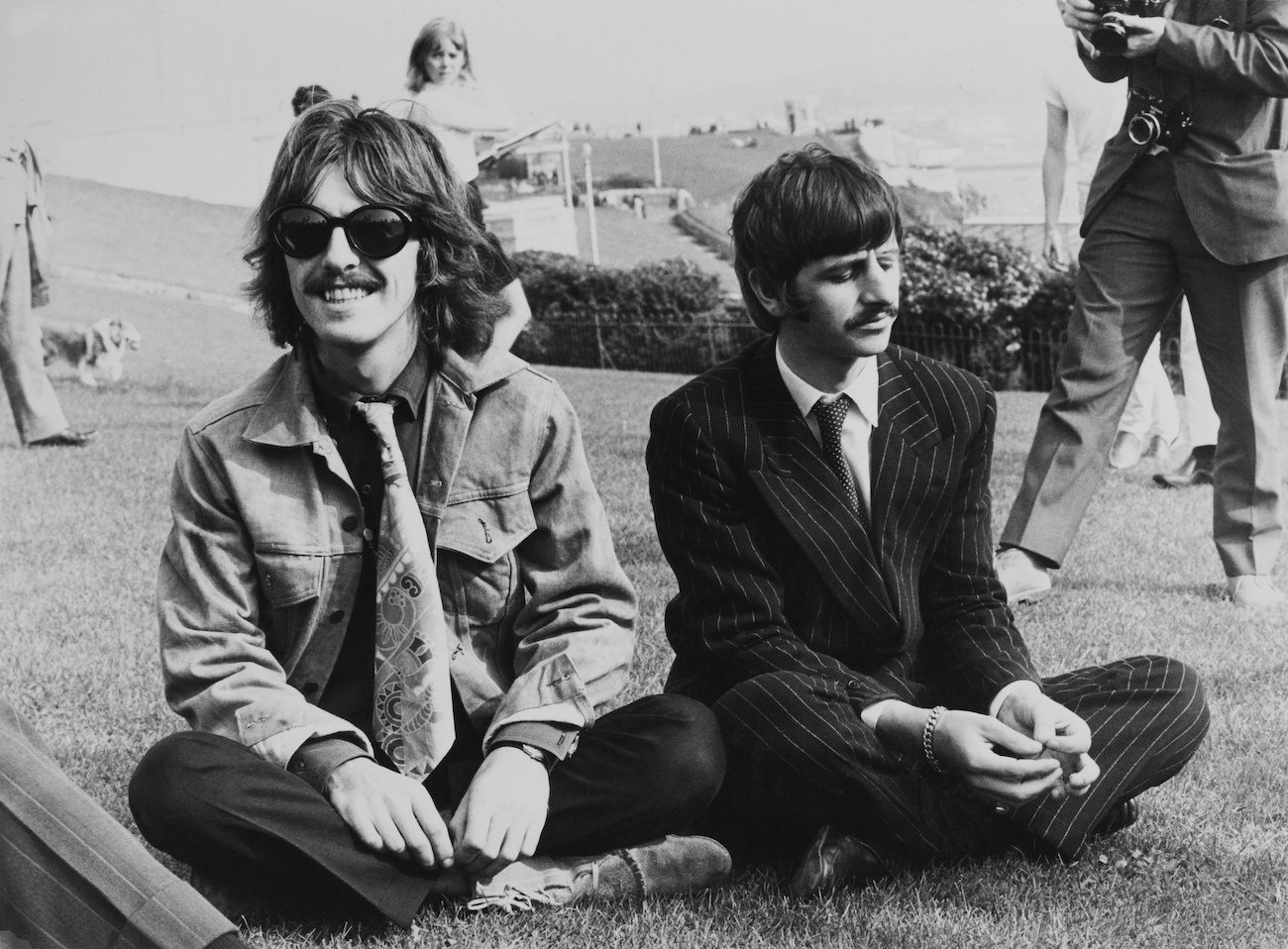
How Paul McCartney’s Banjo and a Monkee Helped George Harrison Make His Debut Solo Album
Paul McCartney’s banjo and a certain Monkee helped George Harrison record his debut solo album, Wonderwall Music, the soundtrack to 1968’s Wonderwall. There were other helpers, too, including some of George’s closest friends.

George Harrison was nervous about making his debut solo album, ‘Wonderwall Music’
In 1987, George told Timothy White at Musician Magazine that his debut solo album, Wonderwall Music, was historical because it came out four weeks before John Lennon released Two Virgins. George became the first Beatle to release a solo album. However, he was initially nervous about making Wonderwall Music.
George made most of the album’s music in London at the end of 1967. Then, he recorded everything in Bombay and caught the attention of director Joe Massot.
George explained, “I don’t know where I met him, but he said he wanted me to do the music to this movie–which didn’t come out until 1968. I said, ‘I don’t know; I haven’t got a guess of how to write music for a movie.’ He said, ‘Aw, we’ve got no budget for the music anyway, so whatever you give me, I’ll have it!’
“I was real nervous with the idea, because he wanted music running through the whole film, but he kept on with me.” George likely took on the project because he was bored with what The Beatles were doing in the recording studio. So, he accepted.
He said, “What I’d do was go into the film studio with a stopwatch–it was really high-tech stuff, eh?–and I’d just be what they call ‘spotting’ the scene to see where the music was going to go, doing click-click with the watch. I’d go back into my studio and make 35 seconds, say, of something, mix it and line it up with the scene.”
George wasn’t alone in the recording studio, though. He had help from many friends.
Paul McCartney’s banjo, a Monkee, and others helped George record his debut solo album
According to the Guardian, George made initial recordings for his debut solo album at Abbey Road in November 1967. Harmonica maestro Tommy Reilly, session mainstay Jim Sullivan, and the Remo Four were there to help.
“We recorded backing tracks to accompany certain points in the film,” Remo Four drummer Roy Dyke said. “George had timed it all with a stopwatch: ‘We need one minute and 35 seconds with a country and western feel.’ Or, ‘We need a rock thing for exactly two minutes.’ Nothing was really written. We’d talk over ideas he wanted, play something, and he’d say, ‘That’s good, keep that. I like the piano there.’ It was very experimental. The idea was to set an atmosphere.”
George had many Indian musicians and members of the Asian Music Circle helping him make the record as psychedelic as possible. Later, George’s son, Dhani, called Wonderwall Music a “full-on freakout record.” Then, George quickly recruited Monkee Peter Tork.
“I’d met George when he was visiting Cass Elliot in Los Angeles, and I was dating Cass’s sister, Leah,” Tork said. “Later, the Monkees met the Beatles in England, and he invited me to his house. He played the sitar and said: ‘I’m working on a soundtrack album, I’d love to have you play a little banjo.'”
Since Tork was without his instrument, George borrowed Paul’s five-string banjo for the session – “which Paul couldn’t play – at least conventionally, because the folk five-string banjo can’t be restrung in reverse order for left-handers, it must be custom made. I played for 45 minutes, George said, ‘Thanks very much,’ and we went our separate ways.”
Tork’s contribution didn’t make the record, but it does appear 15 minutes into the film. “And I did not get paid,” Tork laughed. “George said: ‘We’ll figure that out later.’ He knew that the honour itself was payment enough!”
There were other cameos from George’s famous friends on his debut solo album. Ringo Starr added drums to “Party Seacombe,” and Eric Clapton contributed electric guitar to “Ski-ing.”
George said making ‘Wonderwall Music’ gave him a ‘great opportunity’
In The Beatles, Paul and John Lennon often pushed him and his songs aside. However, Wonderwall Music allowed George to release a whole album of tunes of his own. He also got to experiment and blend Western and Eastern sounds, which, in turn, showed each culture the other’s music. Wonderwall Music was just another example of how George made “minority music” heard.
“It gave me a great opportunity,” George told White. “I was getting so into Indian music then that I decided to use the assignment partly as an excuse for a musical anthology to help spread it.”
George continued, “I used all these instruments that at that time weren’t as familiar to Western people as they are now, like shanhais, santoor, sarod, surbahars, tablatarangs. I also used tambura drones and had Eric Clapton playing blues guitar backwards over them. And loads of horrible mellotron stuff also.”
Wonderwall Music came out before the film, but neither managed to inspire much from audiences, unfortunately. Both vanished into relative obscurity. Many view George’s first post-Beatles record, 1970’s All Things Must Pass, as his debut solo album rather than Wonderwall Music.
“Its significance lies elsewhere, in its affirmation of Harrison’s blossoming individuality, its determination to shine a tender light on an unheralded musical culture, and as a warning flare in the Beatles’ long race to extinction,” the Guardian wrote.


